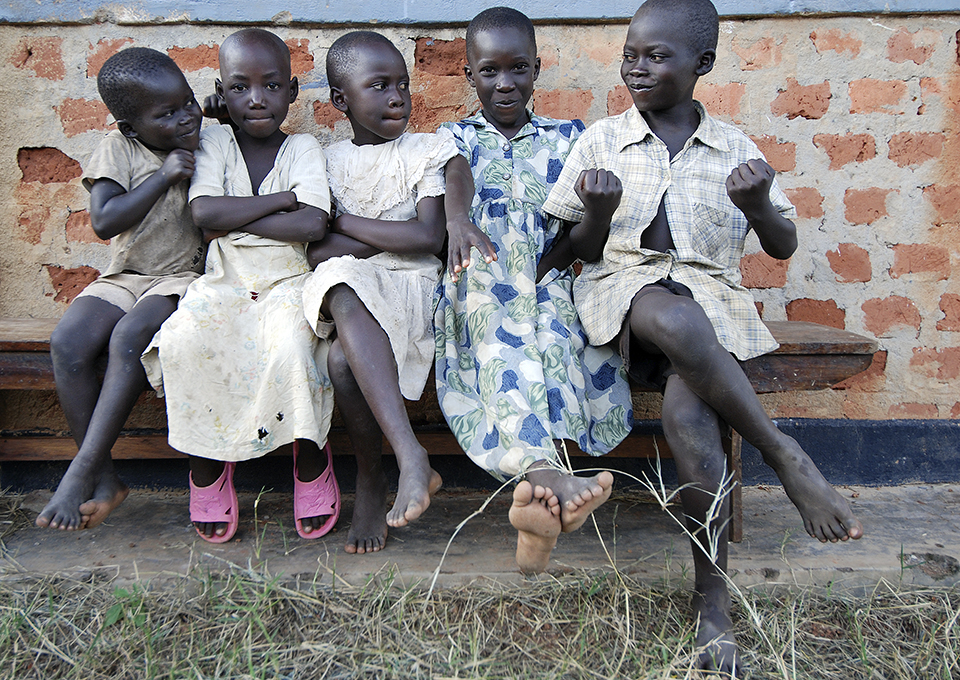“I have the feeling that you’ve been to the moon and back, while we are still digging holes”, Mathias exclaims at the end of an intensive two day workshop about social media.
Ugandan internet
The workshop on Twitter is not the reason why Mathias has said this, but the discovery that I have an app on my Smartphone, that displays all the facts and figures on Uganda. Filled with curiosity the three men study the facts: 50% of the Ugandan people is younger than 14 years old. The average life expectancy is 52 years and almost a million people have HIV/AIDS according to a source dating from 2007.
Jjingo looks at me perplexed. “We work with these people and we don’t know all this. I don’t even know how many people live in this country. We only have obsolete books and the occasional internet in Uganda and here you are and produce the facts as if by magic.” Diligently he starts to copy the facts. With the eagerness with which they absorb any information offered to them. Warily I offer to send him the information by mail. He looks shyly at his paper. “That would be great.”
Sad Stories
Giving a workshop on social media in Uganda is an eye opener, not only for the Ugandans. The day before, I asked them to present their project in one and a half minutes in front af a camera.
“A minute and a half?” A boy named Prince asked. “That is impossible!” “No?” Jaap who is going to film them laughs. “You will have to man!” One by one they rush through the stories they have told a hundred times. About street children, about children who cannot go to school because they have to search for water three hours away from their homes.
Sad stories, worn out by the many times they have been told in a country full of sad stories.
Personalizing
After the first takes they are asked to shorten their story and to personalize them. The aim is to offer beautiful and understandable stories on their websites that give the incentive to their readers to support them with knowledge, material or money. Herman, a tall Ugandan looks a bit baffled when we tell him that the public does not want to struggle through a maze of facts, but wants to be touched by a story.
“Listen”, I say, “I am sitting in front of the television, almost falling asleep. There you are, with a stirring opening, making me want to know more about your organization for street children.”
Off to work he goes with his colleague. Half an hour later he is back. “Sit down in your television chair. You are in for a surprise”. What follows is worthy of an American cops and robbers film, in which the police protect society by mowing down criminal street children with their machine guns.
“But I thought you were trying to protect these children” I say puzzled. “Oops, I forgot”, Herman laughs, completely absorbed in his film.
Street Children Kampala
In the end, he chooses the approach in which he urgently asks the viewers how they would feel if it were their child being chased through the streets of Kampala, treated as scum and searching for food in garbage. It is a disturbing opening.
Once again the stories are presented. This time they are completely different from the first versions. Some of them are pearls, taking as an example the story told by William from Tanzania. One rainy day he was driving his bus, when he saw handicapped people begging in the pouring rain.
Begging
Begging was the only way to earn some money. Going to school is impossible because the little money earned is hardly ever spend on the handicapped. Nobody will employ them in a country with such a high unemployment rate amongst the young. William was touched by the plight of these people and started a workplace for those who had had polio, giving them an opportunity to obtain an education and to fabricate and sell their own products.
The best stories appear to be the positive ones. The whole group agrees on that. They don´t want pity for Africa, because Africa means so much more. The story by Milton, who works for the Women of Uganda Network, is a perfect example.
“I am a happy person, because I live in Uganda” he starts. “Uganda is a beautiful country, the people are friendly, the weather is nice. But Uganda could be a lot better if the Women would have access to better education and information”, he concludes his film.
Impotent
“By the way, the internet is no panacea”, I say after passing a day without a internet connection. “Make sure that you are able to present your stories in different ways. Anthony shakes his head silently. “Now that we mention it”, he says, “is it true that men can become impotent by using the internet? Because if it is, I’d rather not go anywhere near it..
Text: Anneke de Bundel – Images: Nicole Franken
Translation: Adrienne le Brun Hunkar


